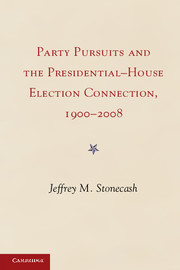Book contents
- Frontmatter
- Contents
- Preface
- Part I Election Patterns and INTERPRETIVE Frameworks
- Part II Explaining a Changing Relationship
- Appendix I Presidential–House Elections by House Districts
- Appendix II The Presidential–House Relationship and Uncontested Races
- Appendix III Alternative Explanations of Change
- Bibliography
- Index
- References
Preface
Published online by Cambridge University Press: 05 January 2013
- Frontmatter
- Contents
- Preface
- Part I Election Patterns and INTERPRETIVE Frameworks
- Part II Explaining a Changing Relationship
- Appendix I Presidential–House Elections by House Districts
- Appendix II The Presidential–House Relationship and Uncontested Races
- Appendix III Alternative Explanations of Change
- Bibliography
- Index
- References
Summary
The present is confusing because we do not really understand the past.
Our understandings of politics evolve. At one time – much of the first half of the 1900s – it was widely understood that presidential and House election results were closely tied together. The partisan votes for presidential and House candidates in House districts were very similar, and we presumed that voting was primarily for a party and not individuals. Then in the 1960s the relationship between presidential and House results declined. By the 1970s a new interpretation emerged about what was dominating elections and how the presidential–House connection was being altered. The conclusion was that House elections were becoming dominated by incumbency, elections were candidate-centered, and parties were of less relevance in voting choices. House incumbents were becoming more immune to shifts in partisan presidential electoral support in the nation. The conventional wisdom quickly became that we were witnessing a diminished capability for elections to simultaneously register voter sentiment in the institutions of the presidency and the House.
[The House elections of the 1960s represent] a set of electoral arrangements that is…quite unresponsive to shifts in the preferences of voters. (1973)
Incumbents have become quite effectively insulated from the electoral effects, for example, of adverse presidential landslides. As a result, a once-notable phenomenon, the so-called coattails effect, has virtually been eliminated. (1975)
The incumbency advantage in House races has increased to such a level during the last decade that the electoral outcomes for president and Congress have become virtually independent. (1983)
Voting in congressional elections has become detached from broad national currents reflecting reactions to the president and national issues and problems. (1985)
No matter which party wins the White House each four years, presidential elections seem to have little impact on the partisan balance in Congress. The discrepancy between presidential and congressional election results is frequently attributed…to a decline in presidential coattails. (1995)
- Type
- Chapter
- Information
- Publisher: Cambridge University PressPrint publication year: 2012

